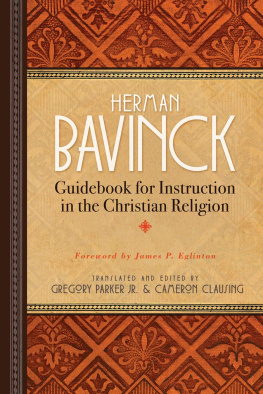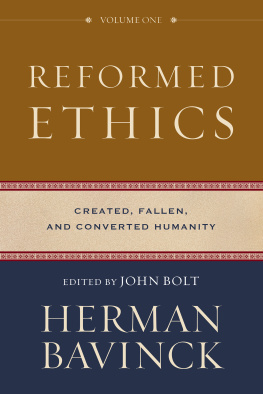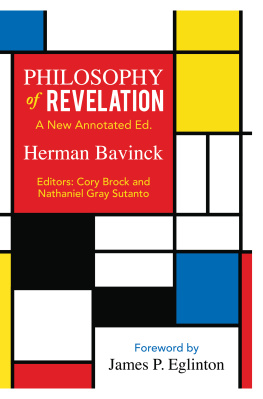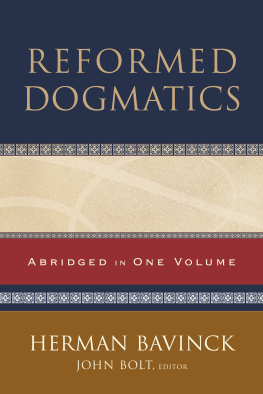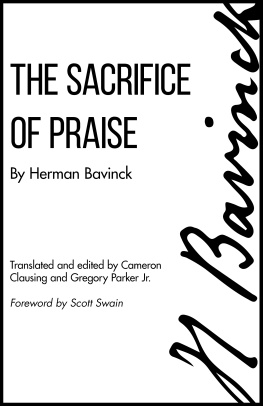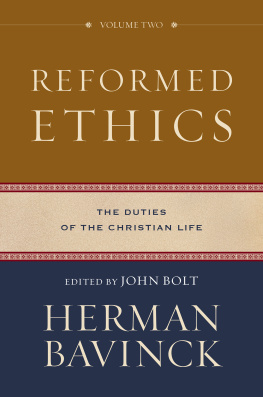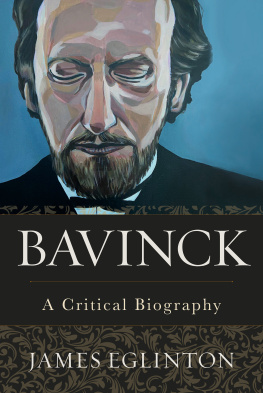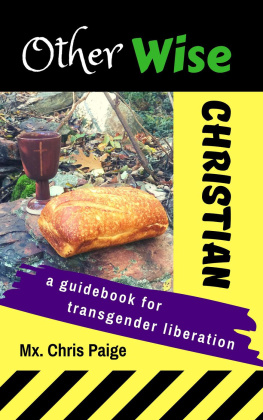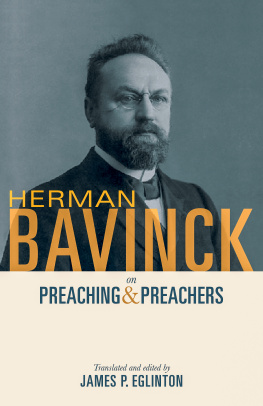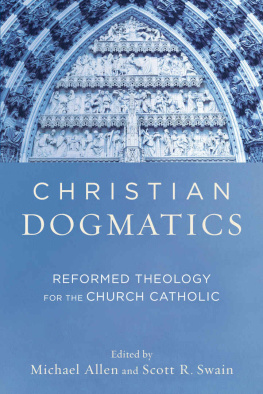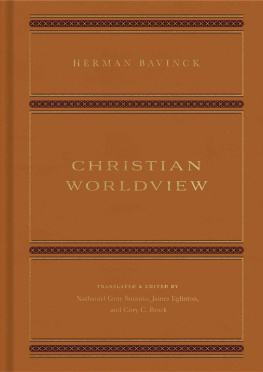To Mpho Grace, Calvin Jack, Madelyn Joy, Calvin Joseph, Oscar James, Judah Gracen, Everett Benjamin, Rosie James, Charles Michael, Augustine Joseph, Maximillian Gustav, and Magnolia Jean
Acknowledgments
Any book that is worth the effort of writing, or in this case translating, is never accomplished alone. We would like to express great appreciation to Dr. James Eglinton for his aid in various areas of the translation. His generosity of spirit nurtured our enthusiasm for the project, and we especially want to thank him for writing the foreword. Dr. Dolf te Velde deserves special mention. In the midst of a busy stretch, he took the time to read portions of this in manuscript form for any issues with the translation. His help was generous and helpful.
We are also grateful for the Edinburgh School of Bavinck of which James is the progenitor. These scholars have made fertile ground for the translation of the Dutch neo-Calvinist. Thank you, Dr. Cory Brock, Dr. Bruce Pass, Dr. Nathaniel Gray Sutanto, Dr. Ximian Xu, Terrence Chu, Israel Jos Guerrero Leiva, and Sebastian Bjernegrd. This book likely would not have reached the Anglophone world without your academic and ecclesial activity. Moreover, your encouragement in the project should not go unheralded.
Wed like to also thank our publishing friends, the staff at Hendrickson Publishers, who have been a delight to work with and have played no small role in the renaissance of Bavinck. Added to this, we would like to thank Henry J. Hoekstra for his work on the Scripture and Subject Indexes.
Most of all, we desire to express gratitude to our families for their unyielding support. Their love, patience, and championing of our scholarship furnished the necessary time to complete the translation and editorial work. Translation projects, though enjoyable, are often arduous; thus, in addition to the above, we are thankful for friends who have supported the project in sundry ways. I, Greg, would like to especially thank Dr. Albert Cheng, Dr. Ty Kieser, Dr. Gayle Doornbos, Dan Hoffstetter, Mark Horn, Andrew and Caitlin Keenan, Trevor and Susy Smith, Mark Evans, Alec Simpson, Camille Simpson, Jeff Mindler, and David Smiley. To the little ones in my life: Madelyn Joy, Calvin Joseph, Judah Gracen, Everett Benjamin, Rosie James, Charles Michael, Augustine Joseph, Maximillian Gustav, and Magnolia Jean, it was truly a joy to undertake this project with you in mind. I, Cam, would like to make special mention of my colleagues at the two institutions where I taught while I worked on this translation: Covenant College and Christ College. Of particular mention, the Bible and Theology department at Covenant College with Dr. Herb Ward, Dr. Hans Madueme, Dr. Scott Jones, Dr. Kelly Kapic, Dr. Dan. MacDougall, Dr. Ken Stewart, and Dr. Jeff Dryden. Christ Colleges faculty have encouraged me at the tail end of this project particularly: Murray Smith, Dr. Greg Goswell, Dr. John McClean, Dr. Jon Pratt, and Dr. Ian Smith. Finally, I dont think I could have finished the work on this without the constant encouragement from my family. My wife, Taryn, has been a constant prod to finish this project. She is my rock, the one who keeps me sane, and connected to reality. My children, Mpho Grace and Calvin Jack, have been the inspiration behind this project. I look forward to the day when I can use it to encourage them in their faith and point them to Jesus.
Soli Deo Gloria
Gregory Parker Jr.
Barto, Pennsylvania
Cameron Clausing
Sydney, Australia
Foreword
When Herman Bavinck published the second edition of his magnum opus , the four-volume Reformed Dogmatics , readers praised its clarity, erudition, depth, and breadth. Across thousands of pages, he led readers through careful interaction with Scripture, the development of Christian theology across its history, and its path forward in the modern age. In the circles for which it was intendedacademics, pastors, and theology studentsit was an instant classic. Despite its brilliance, though, Bavincks efforts were not without their critics: one newspaper review warned readers that the Reformed Dogmatics was not a devotional book, but rather a study book that has only been written for the scientifically educated, also noting that the price of such a work means that it is certainly not within reach of everyones budget.
To many professors, of course, such criticism is easy to ignore: a heavyweight multivolume Dogmatics might be necessary and acclaimed, but it is not likely to be accessible to a general audience. There is only so much use in calling out apples for not being oranges. Bavinck, however, was no such professor. For all his introverted bookishness, he maintained a lifelong commitment to theological engagement with the church, and the general publicboth audiences that needed the results of his Dogmatics (as, in his own words, the theology needed by our age), even if that meant repackaging his Dogmatics in a more easily digestible form.
For this reason, we find Bavinck devoting a great deal of time to the production of two shortened versions of the Dogmatics , one aimed at readers with a university-level education (albeit not in theology), and another pitched for senior high school students and new undergraduate students. The former, Magnalia Dei , has been available in English for some time, first under the title Our Reasonable Faith , and more recently under the much more accurate English title The Wonderful Works of God . The latter, however, his Guidebook for Instruction in the Christian Religion , lay forgotten for a century, and until now had never been made available in English translation. In it, Bavinck sets out to provide something for all those who want to become acquainted with the chief content of our Christian, Reformed confession of faith through the means of a book that is not too long or too expensive.
This book shows us a side of Bavinckthe earnest Christian who was so committed to encouraging students in the faiththat has been largely forgotten in the century since his death. And beyond that, it gives us his presentation of the faith at a distinctive level, in all its simplicity and profundity. That it has laid untouched for so long was a significant omission in a now thriving effort to make his works available in translation. All of those who benefit from that effort now owe a debt of gratitude to Cameron Clausing and Greg Parker, one a PhD graduate, and the other a current PhD student, at the University of Edinburgh. The fruit of their labor is a timely one: in an age in which the church often struggles to see how its theology could be communicated to its younger members, Clausing and Parker have shown us Bavinck as a theologian passionate about bringing theology to teens and young adults in his own context, always recognizing (unbegrudgingly!) that times change, while the truth advances. I hope that this book will inspire many in our generation to do the same.

